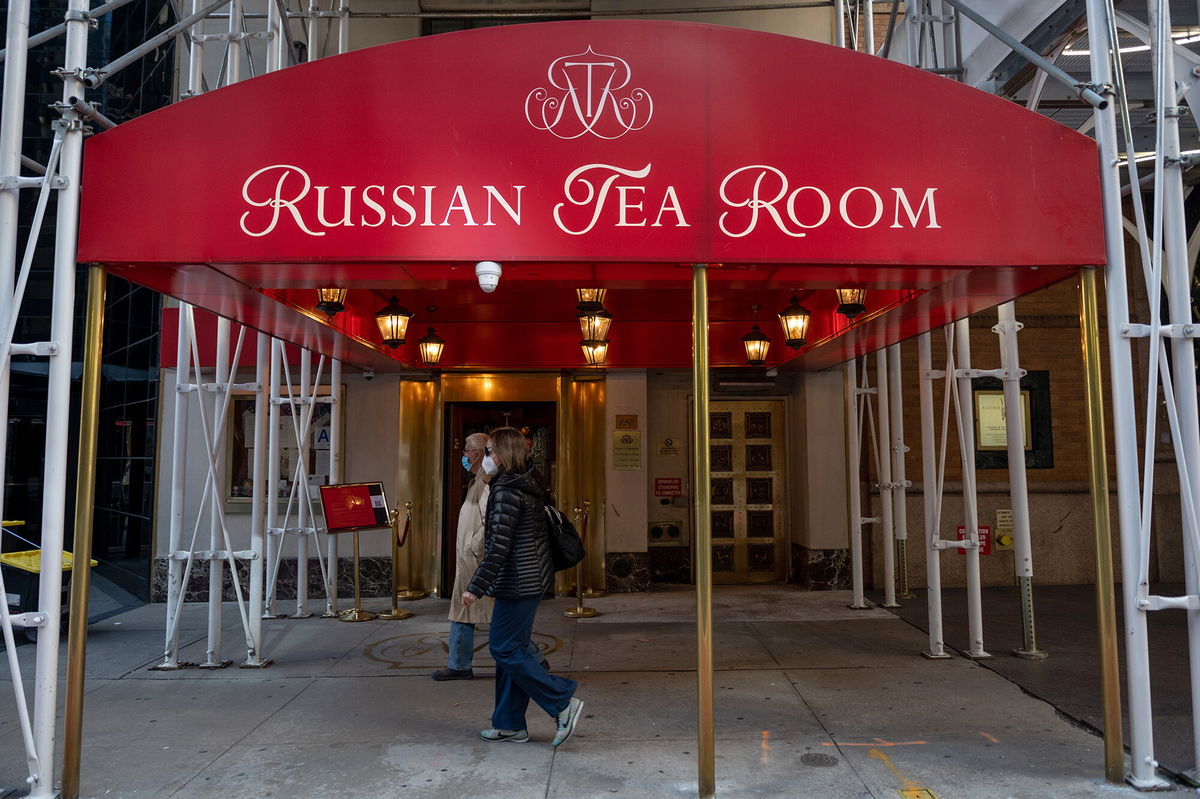The Russian Tea Room in New York City suffers as Ukraine invasion escalates

People wearing masks walk past the Russian Tea Room on October 17
By Kunyi Yang, CNN Business
The Russian Tea Room is a 100-year-old New York City icon that has long drawn in locals and tourists alike. In its heyday, the restaurant hosted such luminaries as choreographer George Balanchine, artist Salvador Dali and composer Leonard Bernstein, and it was featured in the movies “Tootsie” and “Manhattan.”
It drew crowds who attended concerts at nearby Carnegie Hall, only steps away, or dined there after a Broadway show. But at lunchtime Thursday, the eatery was almost vacant, with a handful of customers sitting at only two of its 30 or so red leather banquettes.
Despite its name, the Russian Tea room isn’t Russian at all. It’s actually owned by a financial group incorporated in New York state. It was opened in 1927 by, perhaps apocryphally, “White Russian expatriates who had fled the Bolsheviks,” according to the restaurant’s website. It has had a succession of US owners ever since.
But that hasn’t stopped protesters looking to boycott all things Russian, even if it’s only a name and a cuisine.
On Thursday, the Russian Tea Room’s restaurant’s manager and its staff members all declined to comment when visited by a reporter. But the restaurant’s owners are clearly aware that Russia’s invasion of Ukraine is hurting its business.
“Founded by refugees with Kiev in its blood, the heart of the Russian Tea Room is with the people of Ukraine, but we are not the story here,” the owners said in a statement emailed to CNN. “Russia has gotten away with mass murder for too long and the focus should remain on those suffering and dying in Ukraine.”
A similar statement was posted to the restaurant’s website, which included the colors of the Ukrainian flag with the words “Solidarity with Ukraine” emblazoned on it. “We stand against Putin and the with the people of Ukraine.”
The atmosphere is far different on New York City’s Lower East Side, where crowds have been lining up to eat at the Ukrainian diner Veselka. In just a week, its traffic has risen by up to 75%, said owner Jason Birchard, who added that his place has become a rallying point for the besieged nation.
Veselka — the word means rainbow in Ukrainian — is donating proceeds from its sales of borscht, a traditional Ukrainian beet soup, to an NGO called Razom for Ukraine that is working to deliver medical supplies and equipment to the country. The restaurant has raised $10,000 in the first week and expects another $15,000 in the second, according to Birchard.
It’s also accepting supplies of bandages, batteries, headlamps as well as water purification tablets and clothing at its location. “Donate what you can and we’ll handle the rest,” the restaurant’s website says.
The boycotts extend well beyond New York City. States including Ohio, Oregon and Utah are boycotting Russia-made vodka, even though it represents only a fraction of imported vodka in the US. (On Friday, the maker of Stolichnaya vodka announced it was rebranding itself as Stoli, and pointed out that it is owned by a Luxembourg conglomerate and produced in Latvia.)
The hashtag #BoycottLukoil is trending on social media, urging people not to patronize gas stations branded by the Russian oil giant. However, Lukoil, Russia’s second largest oil company, released a statement that said it was “calling for the soonest termination of the armed conflict.”
Lukoil shares listed in London have lost roughly 99% of their value following the invasion. Trading in the company’s stock was suspended on Thursday.
Birchard, Veselka’s owner, said he is hoping for more solidarity than division during this crisis. “We are living in crazy times. I’m upset and angry about what’s going on,” Birchard said, “But I don’t hold anything against the Russian people.”
Correction: An earlier version of this story incorrectly listed which movies include scenes filmed at the Russian Tea Room. “Tootsie” and “Manhattan” were filmed there, but “When Harry Met Sally” was not.
The-CNN-Wire
™ & © 2022 Cable News Network, Inc., a WarnerMedia Company. All rights reserved.
CNN’s Charles Riley contributed to this story.